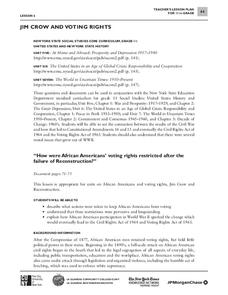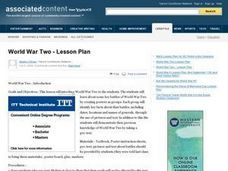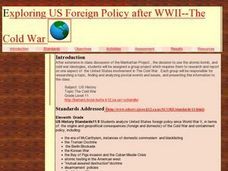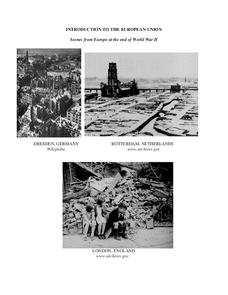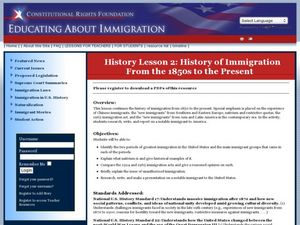Center for History Education
To What Extent Were Women's Contributions to World War II Industries Valued?
Women rose to the challenge when the nation's war effort called them—but were sent home when the GIs came back from World War II. Young historians consider whether the United States valued women's contributions during the war using a...
Curated OER
United States-Japanese Relations in Post World War II Era
Ninth graders analyze political cartoons and posters relating to the United States and Japan in the period following World War II. They discuss the positive and negative consequences of the United States occupation of Japan.
Curated OER
Women and World War II
Students determine the influence of World War II on women's roles in society. Students research the answers to questions about how women were able to enter jobs that had not been open to them before the war and how this affected society....
Curated OER
Impact of the End of World War II on Japan
Ninth graders examine and discuss reasons United States occupied Japan after surrender in World War II, view photographs of Japan at end of War and explore how U.S. occupation affected Japan's political, economic, and social systems, and...
Curated OER
"The New Television Set" a Gateway to the Post World War II Era
Eleventh graders demonstrate their knowledge of the effects of television on the political, economic, religious, social, intellectual and artistic life of the US nation from the 1950's. Research how television shaped public opinion with...
Little Kids Rock
The Influence of Latin Music in Postwar New York City
Music has often been called the international language that transcends cultures and regions. Scholars analyze the impact of Latin American music on New York City culture in the years following World War II. They research music, video,...
City University of New York
Jim Crow and Voting Rights
Class groups examine primary source documents to determine how the voting rights of African Americans were restricted after the failure of Reconstruction, and how African American participation in World War II lead to change.
University of California
Decolonization
The ripple effect from one small event can impact many others. Young historians research the ripple effect World War II had on decolonization in the second installment of an eight-part series. Through primary and secondary documents as...
Curated OER
World War II
High schoolers create a Powerpoint presentation covering key information regarding a World War II battle and present the information to the class in the form of an oral presentation. They then will turn in a summary report including two...
Curated OER
Social Changes in America Caused by World War II
Students research and examine the social changes that occured in the United States during World War II. In pairs they conduct research using a variety of resources, and organize and compose a "Guide to Life" for veterans returning home...
Curated OER
Work in Post-World War II Wisconsin
Students explore the changing nature of work in postwar America by analyzing a variety of sources and conducting their own research. They answer the question, "How did work change in Wisconsin after World War II?"
Curated OER
Wilson's 14 Points
Students analyze political cartoons representing the role of the U.S. in the Post-World War One Era. They work in groups and analyze cartoons for their stereotypes, symbols, and caricatures. After analyzing them, they complete a...
Curated OER
Exploring US Foreign Policy after WWII--The Cold War
Scholars explore U.S. Foreign Policy and Cold War ideologies adopted after WWII. They conduct Internet research on a topic or issue related to the Cold War Era, watch two films, and compose a time line and a multimedia presentation to...
Smithsonian Institution
Mobilizing Children
Scholars find out how the government used propaganda to mobilize children to help in the war effort. Lesson exercises include analyzing a quote from Franklin Roosevelt, viewing propaganda images and posters, and participating in a lively...
Curated OER
Introduction To The European Union
A lot happened to European economics, policy, and social systems after WWII. This 24 page social studies packet provides images, reading passages, comprehension questions, and critical thinking questions regarding all things Europe from...
Center for History Education
African Americans and the Democratic Party
Why did African American voters switch from the Republican Party to the Democratic party during the Depression Era? That is the question young historians attempt to answer as they study primary source documents from the period. The focus...
Curated OER
United States - Japanese Relations In Post World War II Era
Ninth graders explore the relationship between the United States and Japan. In groups, classmates research the treatment of Koreans and Americans as prisoners of war. Pupils examine the effect of politics and agreements during the war....
US House of Representatives
Keeping the Faith: African Americans Return to Congress, 1929–1970
The third lesson in a unit that traces the history of African Americans serving in the US Congress examines the period from 1929 through 1970. After reading a contextual essay that details the few African Americans elected to Congress...
Curated OER
The End of United States' Occupation of Japan
Ninth graders examine and discuss reasons for end of U.S. occupation of Japan in 1952, locate surrounding Asian countries on map, explore changes to Japan after World War II, and discuss how changes in Japan impacted other countries.
Constitutional Rights Foundation
History of Immigration From the 1850s to the Present
The Statue of Liberty may embrace the huddled masses of the world, but has American society always joined in? After young historians read a passage about the history of American immigration in the 19th and 20th centuries, focusing on...
Curated OER
Defining Moments From the Past: Japanese American Internment
Students conduct a mock Congressional Hearing to decide whether or not Japanese Americans who were sent to internment camps during World War II should be provided financial restitution. They research and create a time line of events...
Curated OER
The Red Scare
Students identify and interpret issues of Nativism and Protectionism in early 20th Century America. They analyze the roots of anti-immigrant movements in the Post-World War One United States. Finally, students identify and explore the...
Curated OER
Post-War Japan
Students research the conditions of post-war Japan. In groups, they examine the plans that were put into place for the country and identify the attitude of the Allies. To end the lesson, they discuss the changes that came about in their...
Curated OER
History of Immigration From the 1850's to the Present
Eleventh graders study the history of immigration from 1850 to the present. For this American History lesson, 11th graders compare the 1924 and 1965 immigration acts and give a reasoned opinion on each. Students research,...






